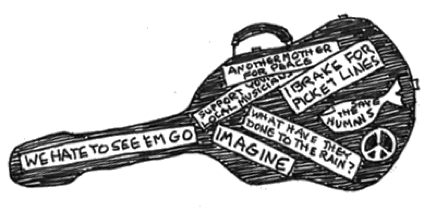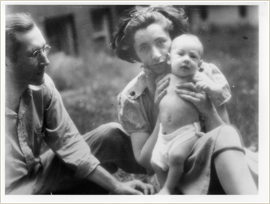


Something a little different this time, a short story I wrote a while ago based on anecdotes my father told me.
DUST
Dust can sit pretty deep on a back road in California at the end
of summer, months with no rain to damp it down, just the occasional car
to stir it up. It was a road like that, and the woman had been standing
beside it a long time looking at the tracks in the dove-colored dust.
The slanting light of late afternoon made the tire tracks seem deeper.
The dog tracks looked huge, and she imagined the little explosions of
dust some ordinary dog must have made to excavate these mastiff-tracks.
Then she imagined—no, remembered—the feel of that same dust on bare
feet. Infinitely soft, soothing, lulling, so that the inevitable hidden
rock or thorn or upturned bottle cap came as a surprise and a betrayal.
She was so lost in soft dry thoughts that when she noticed the noise,
she knew she had been hearing it a long time without noticing. She
looked up and saw a Model A so evenly coated with a bloom of dust she
knew the car had been shiny black before it turned onto this road.
Someone loves that old girl, she thought. Through the dusty windshield
she could see that the driver wore a felt hat, but as he slowed down and
came past her, his face suddenly clear in profile through the open side
window, he looked younger than a hat-wearer should. Dressing the part,
she thought, and smiled. He must have caught that out of the corner of
his eye. He gave a little wave of acknowledgment.
She closed her eyes as the dust billowed up around her, and an
image ran through her mind, an instant replay of the car’s approach. She
saw a yellow and black license plate, small numbers...small numbers
from a long time back, not a classic car plate, and at the same time it
occurred to her that the face had looked familiar. She opened her eyes
wide, but she couldn’t see the back plate for dust. She was sure,
though. She started to follow the tracks. She had nothing particular to
do and no one expecting her, but if she had, she would have followed
that car anyway.
This latest set of tracks was easy to pick out, and as she
walked, she had time to reconsider. The most obvious explanation was not
that she had walked into a different decade but that she had some
relative around here she wasn’t aware of. No, the most obvious
explanation was that it had been a trick of the light, and the man
looked no more like those pictures of her father as young man than any
one of a thousand handsome young men might. But it wasn’t just the face.
Something—the way he waved, or sat, or wore his hat—something
reminded her of her father as she had known him. He had been
forty-two when she was born so he would be what, in her earliest
memories? When does a parent become something separate in a child’s
eyes? The man in the car was younger than forty, maybe even younger than
thirty. The potty wouldn’t be tied to the back bumper for the baby she
once was, and thank goodness for that. Her father had told her about the
trip from Detroit to California, him rinsing out the potty at gas
stations. He had said to her once that when he was growing up, he had
never imagined living past forty. Nothing morbid, just that forty seemed
too far away from his young self to think about at all. She had passed
forty, and forty-two, a while ago.
She didn’t know how far it was to the town ahead. She had come to
her friend’s country place on a paved road and had only meant to walk a
little ways down this side road before she unpacked and fixed something
for dinner so she hadn’t looked for a map, but her friend had said
there was a town this way, just a crossroads really, a backwater. A
dusty backwater, it would be, unless they’d paved the road through town.
The country greens were dulled with dust along the road, and her shoes
were coated. No other cars came to obscure the tracks she followed. She
thought about the dust bowl—just words to her, and black-and-white
photographs in books, but her father had probably seen farms buried in
dust, or for sure had talked to refugees fresh from those farms. Now (if
she was in Now, and not in Then) now it was drought time here in
California where a lot of those refugees had fled to. And maybe another
depression on the way. Her father had predicted one for years but hadn’t
lived to see it.
A lot of things he hadn’t lived to see. He’d taken the
revelations about Stalin in stride, but what would he think about the
downfall of the Soviet Union? All those dreams come to dust. What if
that was her father up ahead, drinking five-cent coffee in some
time-warp café? What on earth would she say to him? She didn’t think
he’d ever put all his hopes in the Soviet Union the way some had. She’d
heard him say the party was too turned toward Europe, didn’t pay enough
attention to American traditions. But till he gave up on it, the party
had been the best vehicle he’d found for his hopeful energy, and what
could she tell him that would be better?
She thought about his fascination with inventions, that engineer
he had invested in, slim and hat-wearing like himself, to develop a
machine for refining gold ore without using water so it could work in
the desert. She remembered that story he had come back from one of his
trips to the desert with, about stopping in one of those little
combination store, coffee shop and gas stations on the road, having a
cup of coffee, and a guy bursting into the store, seemingly out of
breath, saying “Did you see that?” “What?” somebody asked. “That dog!
That black dog! He took a big drink out of that pail out there and it
wasn’t water, it was gasoline! That dog took off running faster’n any
dog I’ve ever seen. I followed ‘im, fast as I could go, see what happen.
Mile, mile and a half, I tell you. Found the dog lying at the side of
the road.” “Was he dead?” her father asked. “No,” replied the man, “he
run out a gas.” And the man dodged out of the store again before anyone
could react. She remembered her father’s delight both at the joke itself
and at being so well and truly caught.
Her mother had wanted him to invest in real estate, which as a
carpenter he knew about, but he had that Yankee propensity for monkeying
around with things, seeing how they could go better. He was as drawn to
tinkering with social systems as his engineer friend was to figuring
out how to make that machine work. She sure wasn’t about to warn him not
to invest in it. He’d never gotten any cash return on it, but he’d
probably gotten his money’s worth in enjoyment.
Well, if this was a time warp, an afternoon in 1930, maybe she
didn’t want to talk to him anyway. Maybe all she wanted to do was to see
him walk around, to see his shy enthusiasm in the young body she had
never seen. He had grown old and in most ways wise without losing that
gusto, but in her lifetime it had come out in arguments and articles and
meetings and election campaigns. All that was left of his days on the
barricades were those stories he told so well. The hunger marches, the
free speech fights, filling up jails.
Maybe that was why she wanted to see him, so she could see those
stories and tell them as well as he had or at least well enough to use
them at all. His voice would be the same, she knew that, because she
remembered the time when he came home from a trip to Detroit talking
about finding a name in a phone book and calling up an old school chum
he hadn’t seen since the eighth grade. He said the man’s voice was so
like the boy’s that the years had melted away as they never would have
if they’d been face to wrinkled face. They hadn’t wanted to follow up
the telephone conversation with a visit in person. And her father’s
voice, on tape, was all she had left, really, and she didn’t even know
where those tapes were.
That wasn’t all she had, of course. She knew that whatever she
found in town, when she got back to the cabin (if she got back to the
cabin) she would take the top off the toilet tank and see if she could
do something about that leak. She shivered and wished she had brought a
sweater and knew a sweater wouldn’t help.
And here was the first building coming into view, a
board-and-batten house with blue trim. No TV antenna or satellite dish,
no car parked outside, so she had no clue either way. The pavement
started this side of the house. Beyond the house she saw an old gas
pump, probably standing in front of a tiny store, and she wouldn’t know
till she got there whether the pump was working or not and whether she
would see this year’s prices if it was. She slowed down, not wanting her
possibilities narrowed either into ordinary disappointment or into
something too strange to cope with.
The Model A was nowhere in sight. There was, of course, a third
possibility. This could be 1930, and her father could have driven
through town and not stopped, and she would be both disappointed and
scared out of her wits. She came up to the old-fashioned pump. The gas
prices were this year’s. She went into the store. There was a counter
with a woman about her age behind it and two men in John Deere caps
sitting on stools with thick tan mugs in their hands, and all three
people were shaking their heads and smiling. She sat down, ordered a cup
of coffee, and looked from face to face. One of the men chuckled.
“You’re gonna think I’m telling you a story,” he said, “but a young man
just run in here all out of breath and says ‘Did you see that?’ ‘What,’ I
says, and he says, ‘That dog! That black dog!’”
©2010 by Nancy Schimmel

Jan McMillan
This
was a lovely story. Having lost my dad when I was a year old I have
created him in my mind but never written about him really. You've
inspired me to try to do that. I think I would have liked your fater!
Jan
Sunday, February 21, 2010 - 07:10 AM

Tuesday, February 16, 2010


DUST





